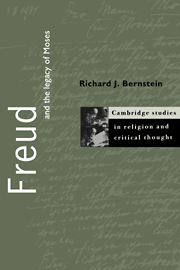Book contents
- Frontmatter
- Contents
- Preface
- List of abbreviations
- 1 The Egyptian origin of monotheism and the murder of Moses
- 2 Tradition, trauma, and the return of the repressed
- 3 Anti-Semitism, Christianity, and Judaism
- 4 “Dialogue” with Yerushalmi
- Appendix: an exchange of letters between Sigmund Freud and Lou Andreas-Salomé
- Notes
- Bibliography
- Index
1 - The Egyptian origin of monotheism and the murder of Moses
Published online by Cambridge University Press: 15 December 2009
- Frontmatter
- Contents
- Preface
- List of abbreviations
- 1 The Egyptian origin of monotheism and the murder of Moses
- 2 Tradition, trauma, and the return of the repressed
- 3 Anti-Semitism, Christianity, and Judaism
- 4 “Dialogue” with Yerushalmi
- Appendix: an exchange of letters between Sigmund Freud and Lou Andreas-Salomé
- Notes
- Bibliography
- Index
Summary
PROLOGUE
In December 1930, Sigmund Freud wrote a short, but remarkable preface for the Hebrew translation of Totem and Taboo.
No reader of [the Hebrew version of] this book will find it easy to put himself in the emotional position of an author who is ignorant of the language of holy writ, who is completely estranged from the religion of his fathers – as well as from every other religion – and who cannot take a share in nationalist ideals, but who has yet never repudiated his people, who feels that he is in his essential nature a Jew and who has no desire to alter that nature. If the question were put to him: ‘Since you have abandoned all these common characteristics of your countrymen, what is there left to you that is Jewish?’ he would reply: ‘A very great deal, and probably its very essence.’ He could not now express that essence clearly in words; but some day, no doubt, it will become accessible to the scientific mind.
Thus it is an experience of a quite special kind for such an author when a book of his is translated into the Hebrew language and put into the hands of readers for whom that historic idiom is a living tongue: a book, moreover, which deals with the origin of religion and morality, though it adopts no Jewish standpoint and makes no exceptions in favour of Jewry. The author hopes, however, that he will be at one with his readers in the conviction that unprejudiced science cannot remain a stranger to the spirit of the new Jewry.
(Vienna, December 1930)- Type
- Chapter
- Information
- Freud and the Legacy of Moses , pp. 1 - 26Publisher: Cambridge University PressPrint publication year: 1998

